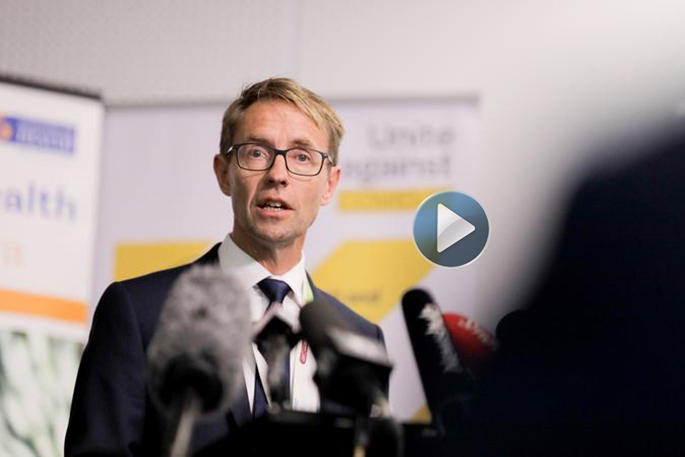UPDATE: There are 39 new confirmed cases and 28 probable cases of COVID-19 in New Zealand today. An increase of 67 cases.
This now brings the total cases to 1106 in New Zealand.
Director-General of Health Dr Ashley Bloomfield is delivering the latest MInistry of Health update this afternoon.
He says 176 people have recovered from the virus.
"Thirteen people are in hospital, with three in ICU. Two people in ICU are in a stable condition and one is in a critical condition.
"There have been no additional deaths."
Ashley says they are still seeing strong links to overseas travel.
He says 43 per cent of the cases are linked to overseas travel, 38 per cent have contacts to confirmed cases and two per cent are being treated as community transmission.
"The balance of the cases are still under investigation."
Auckland Metro, Waikato and Southern are the areas with the highest number of cases under investigation.
Just under 40,000 tests have been carried out so far. There were 3709 tests completed yesterday, the highest number of tests in one single day
Ashley says there are now 12 significant clusters, with 72 cases now linked to the Marist College cluster.
The cluster associated with a wedding in Bluff has now had 62 cases, and the Matamata cluster has 58.
EARLIER:
The All of Government COVID-19 National Response will provide an update at 10 pm today.
Speakers: Dr Ashley Bloomfield, Director-General of Health – health update
What we know so far
There were 82 new cases of COVID-19 in New Zealand on Sunday, bringing the total number of cases to 950.
Director-General of Health Dr Ashley Bloomfied says, these cases are made up of 52 confirmed cases and 30 probable cases.
There are 127 people who have recovered from the virus, he says.
The number of people in hospitals with COVID-19 has dropped since Saturday.
There were 10 people in hospital and one person in ICU at Wellington Regional Hospital – all of these patients are stable, Ashley says.
Saturday was highest single day of testing at 3631, bringing total tests to 33,116, he says. There is now testing capacity for 6000 per day.
He says the number of new cases appears to be levelling off now.
Contact tracing at forefront of fight against COVID-19
The Ministry of Health says a significant increase in New Zealand's ability to carry out contact tracing is proving vital at the forefront of the fight against COVID-19, with hundreds of staff mobilised to carry out the work and 5 thousand close contacts tracked so far.
The Government's dedicated contact tracing service set up for COVID-19 is also now seeing more than 700 contacts being traced in a single day.
In March, the Government announced a dedicated $500 million fund to help protect New Zealanders and their health around COVID-19, and that included a near doubling in resources for public health units specifically to increase capacity for contact tracing.
Staff in public health units have been recognised as a first line of defence against infectious diseases, but further resourcing was required to handle a pandemic on the scale of COVID-19. Last month's announcement included more than $40 million immediately into public health, with a strong emphasis on contact tracing.
This included standing up a new contact tracing workforce, the National Close Contact Service (NCCS), based at the Ministry of Health in Wellington. It backs up and supports the great work being done by PHUs and DHBs around the country.
‘As of Saturday, 4909 close contacts had been traced by the NCCS since it was stood up on March 24, with 702 contacts traced in a single day on Thursday,' says Director of Public Health Dr Caroline McElnay. ‘Originally it was making 760 calls a day – now that's more than 2 thousand.'
Along with the established units in the regions, the NCCS people are working hard to trace and track contacts of confirmed cases. The team is currently 190 strong, and is led by qualified nurses, supported by contact centre staff and other agencies as appropriate. It will be scaled up further as needed.
On average, the NCCS has about 100 people a day in its national call centre, split across two shifts operating from 8 in the morning till 8.30 at night. That's double the staff when the service began. The centre now also has the capability for staff to be working remotely.
‘This represents great work by a dedicated team and the Ministry wants to thank them, and staff in the DHB public health units around New Zealand,' says Dr McElnay.
‘Contact tracing is a vital part of any public health work during an outbreak.'
There's more information around the importance of contact tracing at Contact tracing for COVID-19.
The Ministry adds that next time people are in touch with their general practice, it's a good idea to check that their contact details are up to date in case they're needed.



0 comments
Leave a Comment
You must be logged in to make a comment.